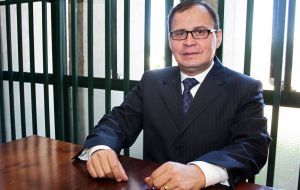MercoPress. South Atlantic News Agency
Another major fraud investigation in Brazil: companies funds pensions; US$ 25bn alleged damages
 Federal judge overseeing the case, Vallisney De Souza Oliveira, ordered 39 people under investigation to suspend their corporate roles and forfeit their passports
Federal judge overseeing the case, Vallisney De Souza Oliveira, ordered 39 people under investigation to suspend their corporate roles and forfeit their passports  JBS shares fell 10%, after billionaire brothers Wesley and Joesley Batista who run the family's company J&F Investimentos were ordered away from the business
JBS shares fell 10%, after billionaire brothers Wesley and Joesley Batista who run the family's company J&F Investimentos were ordered away from the business Brazilian police launched an investigation of fraud at state-run companies' pension funds on Monday, as a judge ordered dozens of senior financiers and executives away from their firms, including the chief executive of the world's biggest beef exporter.
Police carried out five arrests, more than two dozen interrogations and over 100 search warrants, seizing jewels, luxury vehicles, artwork and an airplane in an asset freeze to cover up to 8 billion reais (US$2.5 billion) in alleged damages.
The federal judge overseeing the case, Vallisney De Souza Oliveira, ordered the chief executive of meat packer JBS SA and 39 others under investigation to suspend their corporate roles, avoid all capital market activity and forfeit their passports in order to avoid jail.
JBS shares fell 10%, the biggest drop in six months, at the prospect of billionaire brothers Wesley and Joesley Batista, who run JBS and their family's holding company J&F Investimentos, respectively, from serving at the group's firms.
The probe of the pension funds is the latest in a string of investigations into corruption at the vast overlap of Brazilian business and politics, rattling Latin America's largest economy and feeding political instability.
The four pension funds under investigation, which controlled about 280 billion reais in assets last year, have been an important source of investment in Brazil's credit-starved economy, but political connections at the state-run firms have raised questions about influence in their decisions.
The pension funds caught up in Monday's investigation are those of state-run banks Caixa Economica Federal [CEF.UL] and Banco do Brasil, postal service Correios and oil giant Petrobras which has been ground zero of the graft investigations roiling the nation.
Yet police said their investigation focused on losses to pensioners from reckless or fraudulent investments throughout the Brazilian economy.
Other executives affected by the judge's order include the chief executive of wood pulp maker Eldorado Brasil Celulose SA, also controlled by the Batista family, Jose Carlos Grubisich; and Denise Pavarina, the head of the asset management unit at lender Banco Bradesco SA.
Press representatives for J&F and Eldorado said their executives were collaborating with the investigation. JBS referred comment to J&F.
Bradesco said its asset management units “follow the regulations in funds under management and rules by regulators” and that the bank is cooperating with authorities.
Pension funds Previ, Petros and Funcef said they were collaborating with police. Petros added that the investigation involved decisions made in 2011. Postalis did not immediately respond to a request for comment
Caixa, Bradesco, Banco Santander Brasil and fund manager Rio Bravo Investimentos Ltda confirmed that their asset management units were also targeted by the operation.
Santander Brasil said the federal police asked for documents related to investments by the pension funds in the rig lesser Sete Brasil, which is under bankruptcy protection, and in a fund called Global Equity.




Top Comments
Disclaimer & comment rules-

-

-

Read all commentsAnother reason why the advances paid for by the commodity boom in Brazil are now being slowly eroded after the boom ended and the easy money disappeared.
Sep 07th, 2016 - 12:17 pm 0While Australia just celebrated 3.3% growth for the last year and its 25 year of unbroken growth. Growth that preceded the commodities boom. And has lasted long after the commodity boom went bust.
It's hard to really impress upon people in some countries how much a strong legal and political system together with constant vigilance against fraud and waste can make all the difference.
@ 1 Skip
Sep 07th, 2016 - 12:51 pm 0“It's hard to really impress upon people in some countries how much a strong legal and political system together with constant vigilance against fraud and waste can make all the difference.”
You know, probably better than me, that the real problem is the LatAm character of 'they deserve a bit as long as it's not overdone and WE get some as well'.
In Uruguay the extreme tax levels on businesses means that even the straightest of people HAVE to bend the rules a little just to survive and keep their businesses afloat.
In Brazil however that philosophy is taken to the extremes and not only tolerated by the governments but 'improved' upon to the point they find themselves now.
I have no idea how this mindset will ever be altered nevermind be brought to the same levels as Australia.
Yeah, for all the evils of colonialism, I still thank the lord that it was the British and not the Spanish or Portuguese that settled Australia. The French wouldn't have been all bad as it would have been post-revolutionary France and not Catholic France and I would have been happy if the Dutch did as they were a mercantilist empire like the British but probably would have imported millions of Indonesians and we would now be Indonesian.
Sep 07th, 2016 - 06:47 pm 0But thank God it was the British. The rule of law and strong, flexible and open government. There was no possibility of Australian not being colonised as the Aboriginals were divided into possibly hundreds of nations without the ability to engage in any sort of foreign relations without disrupting their way of life.
Australia has many faults but the commodities boom came and went and we are still growing. Are we booming? Nope! But we are not mired in recession with every major government business being found to have fleeced the country of billions of dollars.
The funny thing is that Australia has only had 228 years of European colonisation and 115 years as a country and technically 30 years of full independence. Brazil, Uruguay and Argentina have had 196, 191 and 200 years of actual independence to shape their own countries and they still make a fecking mess of it.
Commenting for this story is now closed.
If you have a Facebook account, become a fan and comment on our Facebook Page!